Energy Efficiency
Rating Heat Pump Energy Efficiency in HVACs

Are you tired of high energy bills and inefficient HVAC systems? We’ve got you covered.
In this article, we delve into the factors that affect heat pump energy efficiency in HVACs.
From understanding SEER and HSPF ratings to comparing different heat pump models, we provide a detailed analysis.
Plus, we offer tips on how to improve energy efficiency and emphasize the importance of proper maintenance.
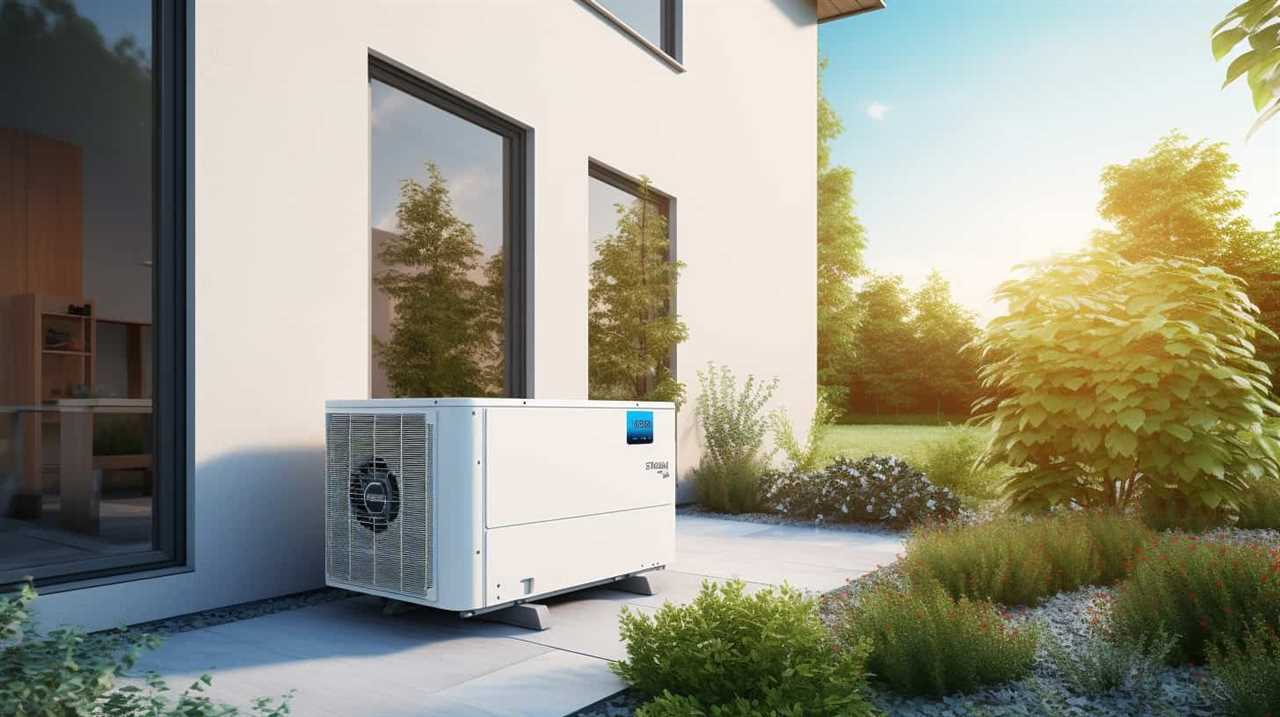
Get ready to liberate your HVAC system and save some serious cash!
Key Takeaways
- SEER and HSPF ratings are important for comparing the energy efficiency of different heat pump models.
- Higher SEER and HSPF ratings indicate more energy-efficient units.
- Choosing a heat pump with higher ratings can lead to significant energy cost savings.
- Regular maintenance is crucial for enhancing the energy efficiency of heat pumps and ensuring optimal performance.
Factors Affecting Heat Pump Energy Efficiency in HVAC Systems
In our discussion of factors affecting heat pump energy efficiency in HVAC systems, we’ll examine various variables that can influence the overall performance of these systems.
One important factor to consider is heat pump energy consumption. The amount of energy that a heat pump utilizes directly affects its efficiency. By optimizing heat pump performance, we can minimize energy consumption and maximize efficiency. There are several ways to achieve this, such as ensuring proper insulation, regular maintenance, and correct sizing of the heat pump unit.
Additionally, factors like outdoor temperature, thermostat settings, and air flow also play a role in heat pump energy efficiency. Understanding and addressing these variables can lead to significant improvements in the overall performance and efficiency of HVAC systems.

Now, let’s delve into understanding the SEER and HSPF ratings for heat pump efficiency.
Understanding SEER and HSPF Ratings for Heat Pump Efficiency
Let’s explore the SEER and HSPF ratings to gain a better understanding of heat pump efficiency. These ratings are crucial in determining the performance and energy-saving capabilities of heat pumps. Here’s what you need to know:
-
SEER (Seasonal Energy Efficiency Ratio) measures the cooling efficiency of a heat pump. The higher the SEER rating, the more energy efficient the heat pump is in cooling mode.
-
HSPF (Heating Seasonal Performance Factor) measures the heating efficiency of a heat pump. A higher HSPF rating indicates better energy efficiency in heating mode.
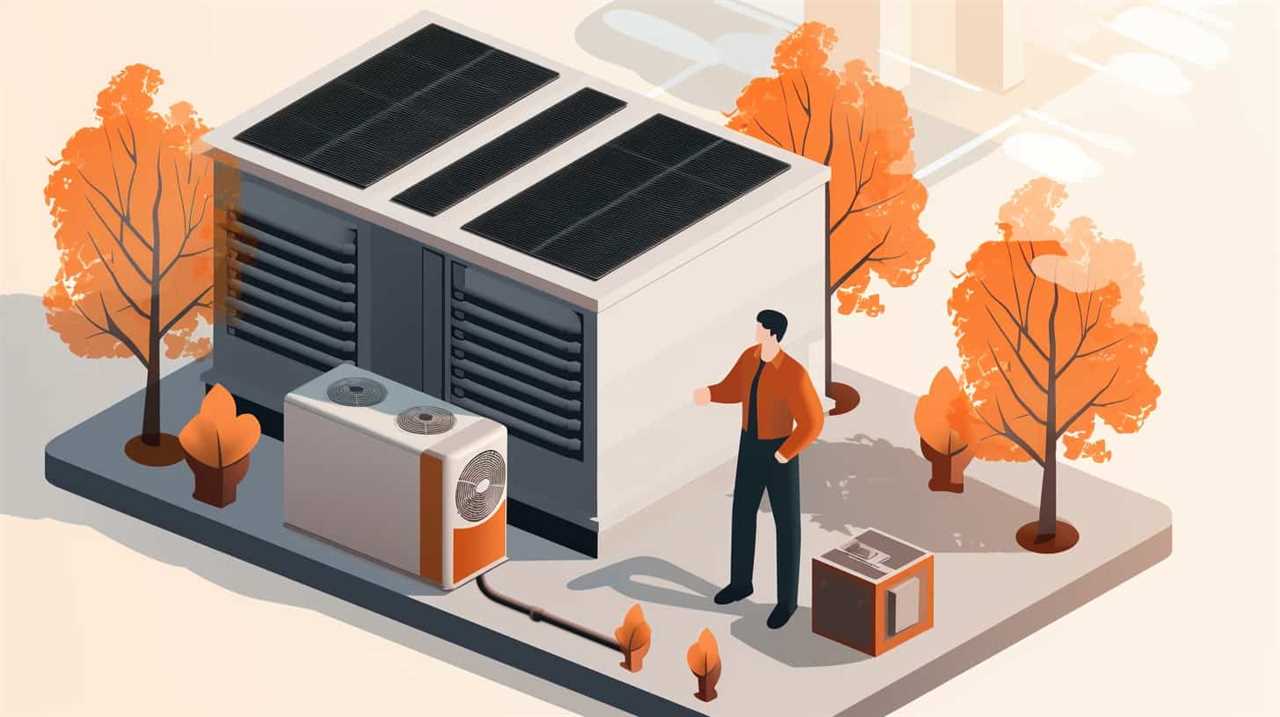
-
Both SEER and HSPF ratings are determined by calculating the ratio of cooling or heating output to the energy input. These ratings help consumers compare the efficiency of different heat pump models.
-
Energy-saving technologies, such as variable-speed compressors and advanced refrigerants, can significantly impact the SEER and HSPF ratings, resulting in improved heat pump performance and reduced energy consumption.
Understanding these ratings enables consumers to make informed decisions and choose heat pumps that offer optimal energy-saving technology and performance.
Comparing Energy Efficiency of Different Heat Pump Models in HVACs
We can compare the energy efficiency of different heat pump models in HVACs by evaluating their SEER and HSPF ratings. These ratings provide valuable information about the performance of the heat pump and its ability to save energy.
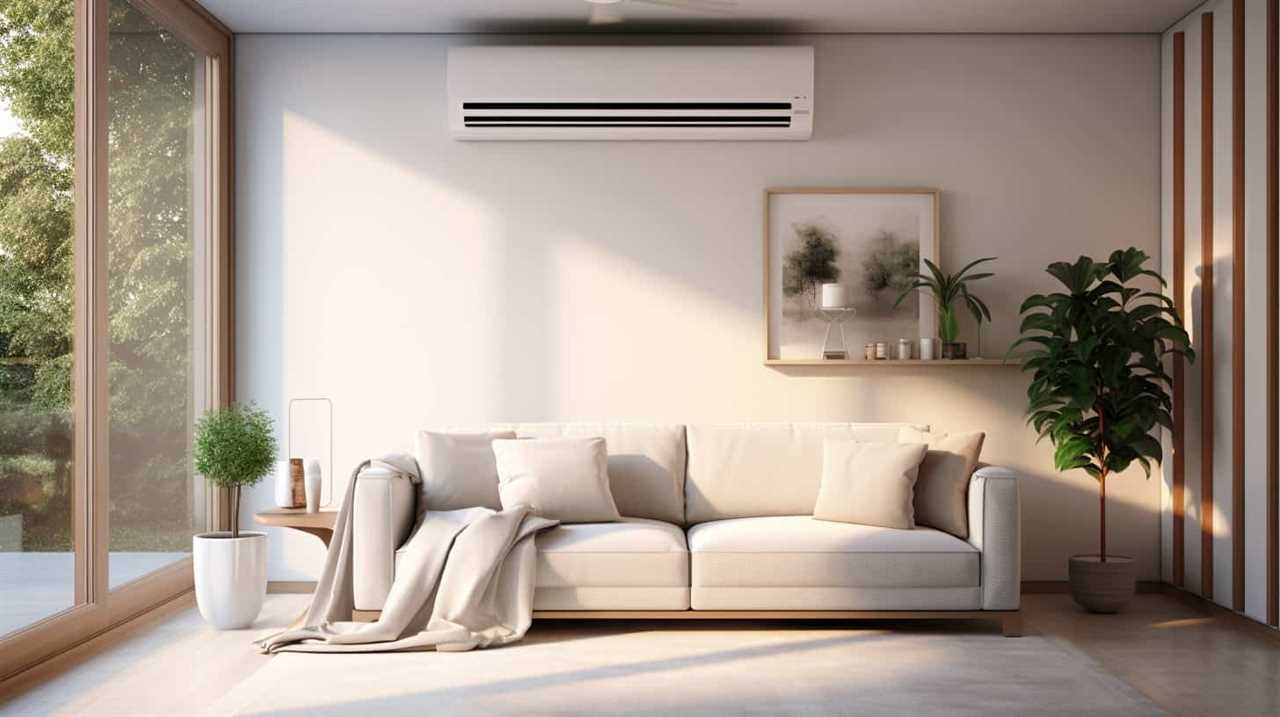
The Seasonal Energy Efficiency Ratio (SEER) measures the cooling efficiency of the heat pump, while the Heating Seasonal Performance Factor (HSPF) measures its heating efficiency. When comparing heat pump models, a higher SEER and HSPF rating indicates a more energy-efficient unit.
By choosing a heat pump with higher ratings, consumers can save on energy costs and reduce their environmental impact. Manufacturers are constantly improving the performance of heat pumps by incorporating energy-saving technology, resulting in higher SEER and HSPF ratings.
It’s important for consumers to consider these ratings when selecting a heat pump for their HVAC system.
Tips for Improving Heat Pump Energy Efficiency in Your HVAC System
One simple way to improve heat pump energy efficiency in our HVAC system is by regularly cleaning or replacing air filters.

Here are some additional tips for maximizing heat pump energy efficiency and avoiding common mistakes that decrease efficiency:
-
Schedule regular maintenance: Have a professional inspect and tune up your heat pump at least once a year to ensure it’s running at peak performance.
-
Adjust thermostat settings: Set your thermostat to a comfortable but energy-saving temperature. Avoid drastic temperature changes that can put unnecessary strain on your heat pump.
-
Seal air leaks: Inspect your home for air leaks around windows, doors, and ductwork. Seal any gaps or cracks to prevent hot or cold air from escaping.

-
Use programmable thermostats: Install a programmable thermostat to automatically adjust the temperature when you’re away from home, saving energy and maximizing efficiency.
The Importance of Proper Maintenance for Heat Pump Energy Efficiency in HVACs
How can regular maintenance improve the energy efficiency of our heat pump in HVAC systems?
Proper maintenance plays a crucial role in enhancing the energy efficiency of heat pumps in HVAC systems. By performing regular maintenance, we can ensure that our heat pump operates at its optimal efficiency, resulting in energy savings and reduced utility costs.
Maintenance benefits include cleaning and replacing air filters, which improves airflow and reduces strain on the system. Regular inspections and tune-ups help identify and address any issues that may be affecting the heat pump’s performance. This allows for timely repairs, preventing further energy wastage.

Additionally, lubricating moving parts and checking refrigerant levels ensure smooth operation and optimal heat transfer. Incorporating energy-saving practices into our maintenance routine will help maximize the energy efficiency of our heat pump and contribute to a more sustainable HVAC system.
Frequently Asked Questions
How Are Heat Pump Energy Efficiency Ratings Determined?
When determining heat pump energy efficiency ratings, we consider factors such as heat pump performance and other variables that affect energy efficiency. These ratings provide a quantitative measure of how efficiently a heat pump operates.
Can I Improve the Energy Efficiency of My Existing Heat Pump System?
Oh, yes, we can definitely improve the energy efficiency of your existing heat pump system! By optimizing performance and implementing efficient practices, we can enhance its efficiency and save you energy and money.
What Is the Average Lifespan of a Heat Pump System?
The average lifespan of a heat pump system can vary depending on factors such as usage, maintenance, and quality. It is important to follow maintenance tips and consider the average cost of replacement when planning for the future.
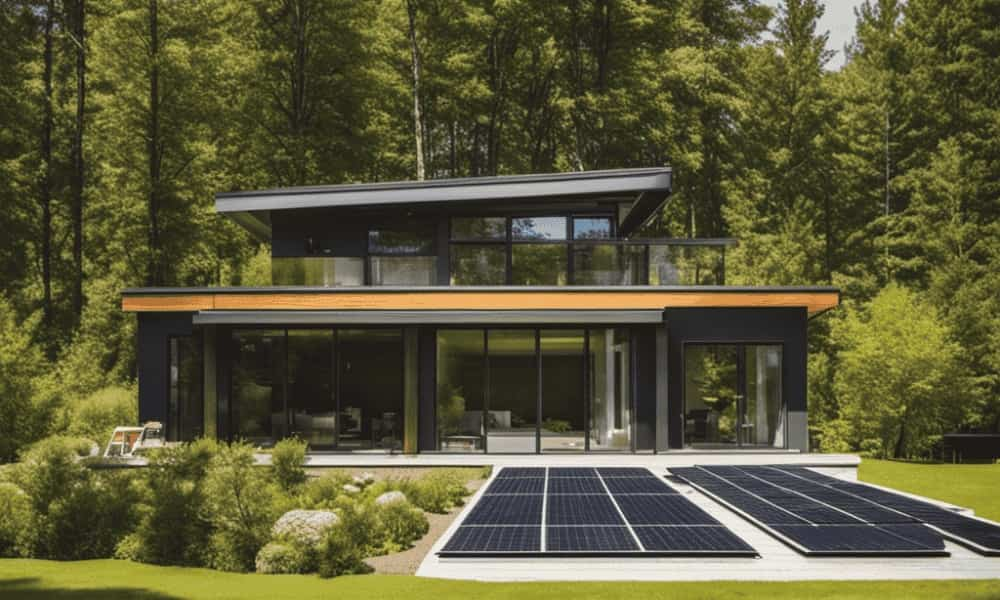
Are There Any Tax Credits or Incentives Available for Upgrading to a More Energy-Efficient Heat Pump?
Tax credits and financial incentives are available for upgrading to more energy-efficient heat pumps. These incentives can significantly reduce the cost of the upgrade and provide a financial boost for homeowners.
What Are the Potential Cost Savings of Upgrading to a Higher-Rated Heat Pump System?
Potential energy savings from upgrading to a higher-rated heat pump system can result in significant cost savings. The return on investment can be seen through reduced energy bills and increased efficiency in heating and cooling.
Conclusion
In conclusion, it’s crucial to prioritize heat pump energy efficiency in HVAC systems. By understanding SEER and HSPF ratings and comparing different models, we can make informed choices to maximize energy savings.
Implementing tips such as regular maintenance and improving insulation can further enhance efficiency.
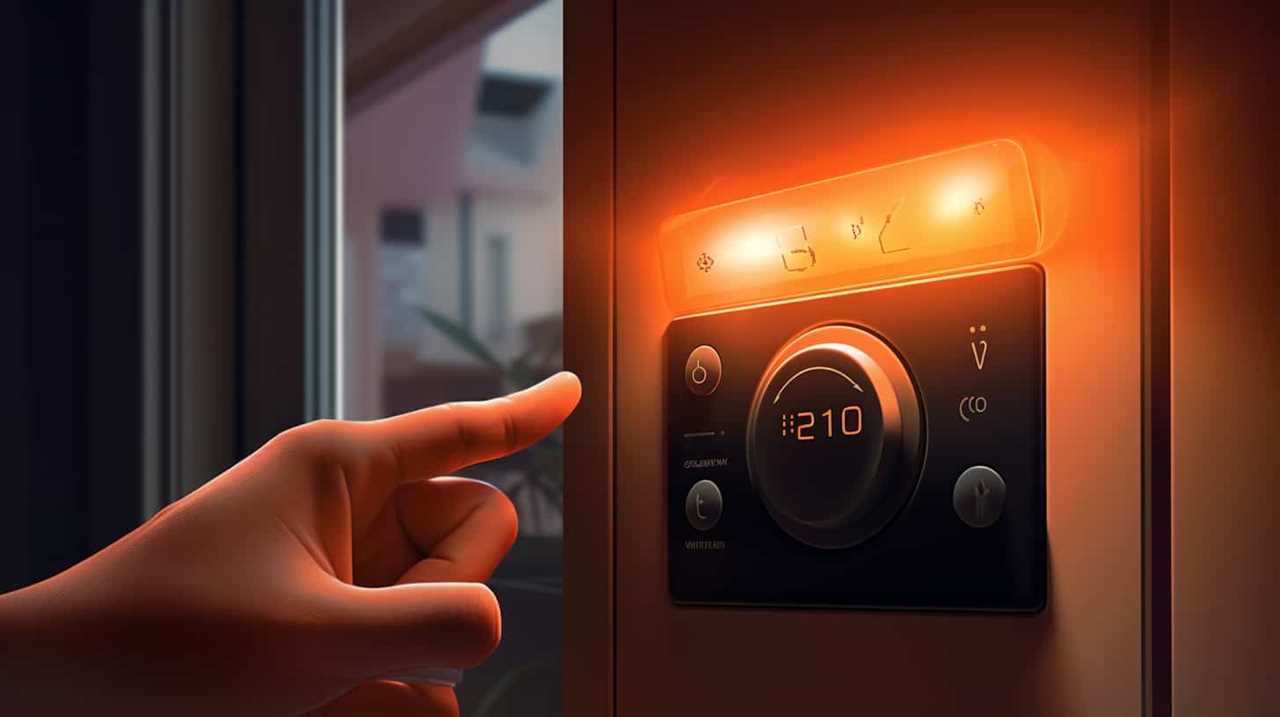
Remember, a well-maintained heat pump is like a well-oiled machine, keeping your HVAC system running smoothly and your energy bills in check.
Energy Efficiency
Kiss High Bills Goodbye: Energy Conservation With Heat Pumps

Are you tired of sky-high energy bills? Well, kiss those bills goodbye because we have the solution for you!
In this article, we will show you how to save energy and money with heat pumps.
With our expert tips and tricks, you’ll learn the basics of heat pumps, understand their efficiency, and discover how to optimize settings for maximum energy savings.
Get ready to say goodbye to high bills and hello to energy conservation!
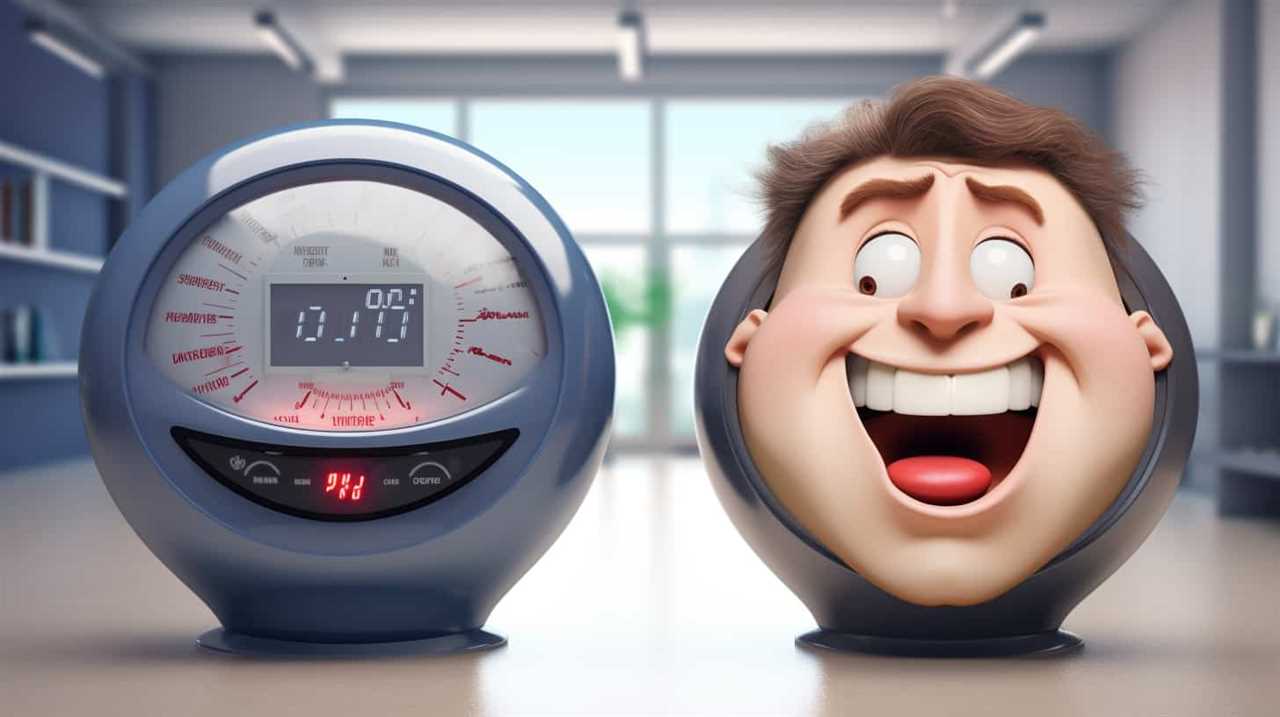
Key Takeaways
- Heat pumps transfer heat from one area to another, providing both heating and cooling capabilities.
- Regular maintenance is essential for optimal performance and efficiency, including cleaning or replacing air filters and checking refrigerant levels.
- Optimizing heat pump settings by adjusting the thermostat temperature can maximize energy savings.
- Insulation and sealing techniques, such as preventing heat loss and sealing air leaks, improve heat pump efficiency.
The Basics of Heat Pumps for Energy Conservation
Let’s dive into the fundamentals of heat pumps for energy conservation.
Heat pump installation is a smart choice for homeowners looking to reduce their energy consumption and save money on utility bills. These systems work by transferring heat from one area to another, rather than generating it.
This means that during the winter, heat pumps can extract heat from the outside air and bring it indoors to warm your home. In the summer, the process is reversed, with heat being removed from your home and expelled outside.
The benefits of heat pumps are numerous. They’re highly efficient, using less energy than traditional heating and cooling systems. They also provide both heating and cooling capabilities, making them versatile and cost-effective.

With proper installation and regular maintenance, heat pumps can significantly contribute to energy conservation and reduce your carbon footprint.
Understanding the Efficiency of Heat Pumps
We can gauge the efficiency of heat pumps by looking at their coefficient of performance (COP). The COP is a ratio that measures how much heat energy a heat pump can transfer compared to the amount of electrical energy it consumes. A higher COP indicates greater efficiency.
To ensure optimal performance and efficiency of heat pumps, regular maintenance is essential. This includes cleaning or replacing air filters, checking and repairing refrigerant leaks, and lubricating fan motors. Troubleshooting heat pump issues promptly can also help maintain efficiency. Common issues include incorrect thermostat settings, dirty coils, and faulty electrical connections.
By addressing these problems, we can ensure that our heat pumps are operating at their maximum efficiency, reducing energy consumption and saving on utility bills.
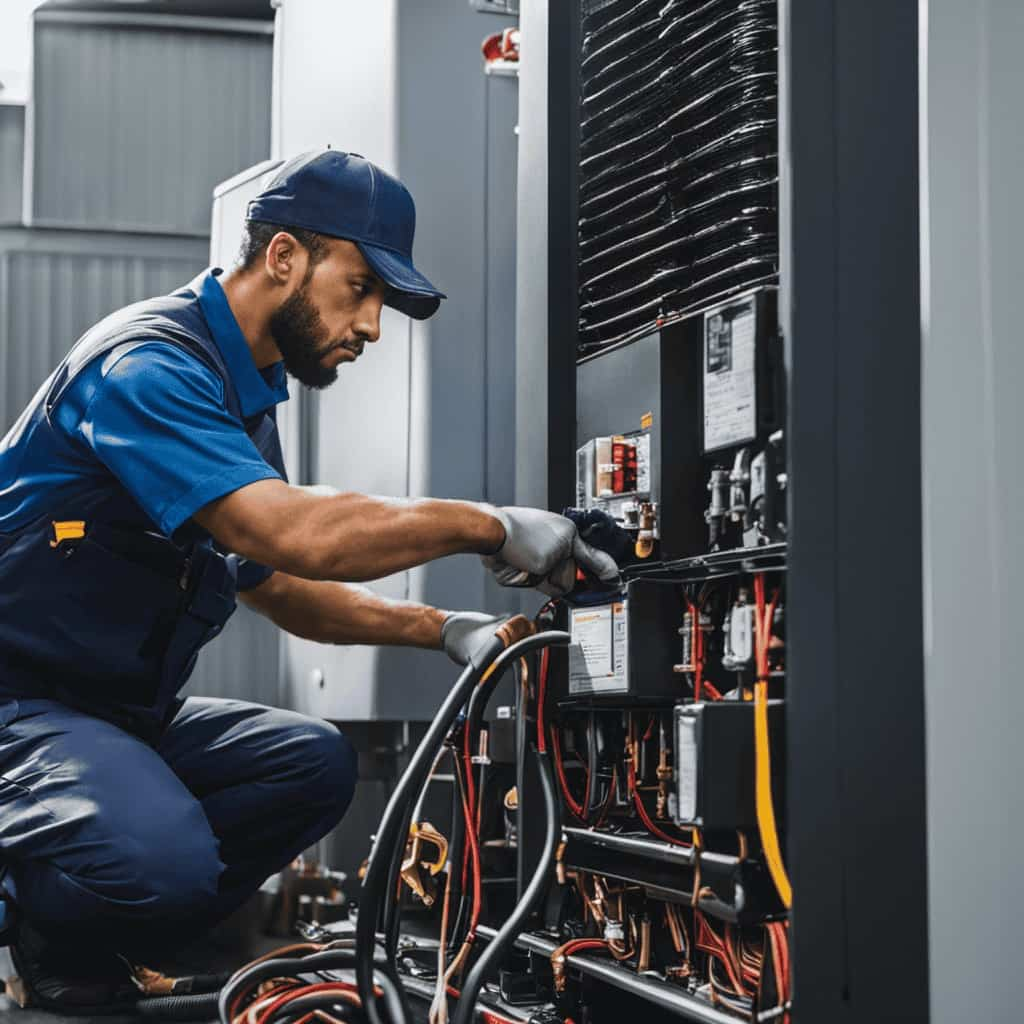
Now, let’s explore how to optimize heat pump settings for maximum energy savings.
Optimizing Heat Pump Settings for Maximum Energy Savings
To achieve maximum energy savings, adjust the thermostat settings by lowering the temperature by 1 to 2 degrees Celsius during colder months and raising it by the same amount during warmer months. This simple adjustment can make a significant impact on your energy consumption and ultimately reduce your bills. Additionally, regular heat pump maintenance is essential to ensure optimal performance and efficiency. Cleaning or replacing air filters, checking refrigerant levels, and inspecting coils are some of the maintenance tasks that can help keep your heat pump running smoothly. Furthermore, it’s worth exploring heat pump rebates offered by utility companies or government programs. These rebates can provide financial incentives for upgrading to a more energy-efficient heat pump system. By optimizing heat pump settings and staying on top of maintenance, you can maximize your energy savings and contribute to a greener future.
| Heat Pump Maintenance | Heat Pump Rebates |
|---|---|
| Clean or replace air filters | Explore utility rebates |
| Check refrigerant levels | Look for government programs |
| Inspect coils | Save money while upgrading |
Insulation and Sealing: Key Factors in Heat Pump Efficiency
How can insulation and sealing impact the efficiency of heat pumps?
Insulation and sealing play a crucial role in maximizing the efficiency of heat pumps by preventing heat loss and air leakage. Here are some key benefits of insulation and sealing techniques:

-
Insulation benefits:
-
Reduces heat transfer between the indoor and outdoor environments, ensuring that the conditioned air stays inside the building.
-
Minimizes the workload on the heat pump, allowing it to operate more efficiently and consume less energy.
-
Sealing techniques:
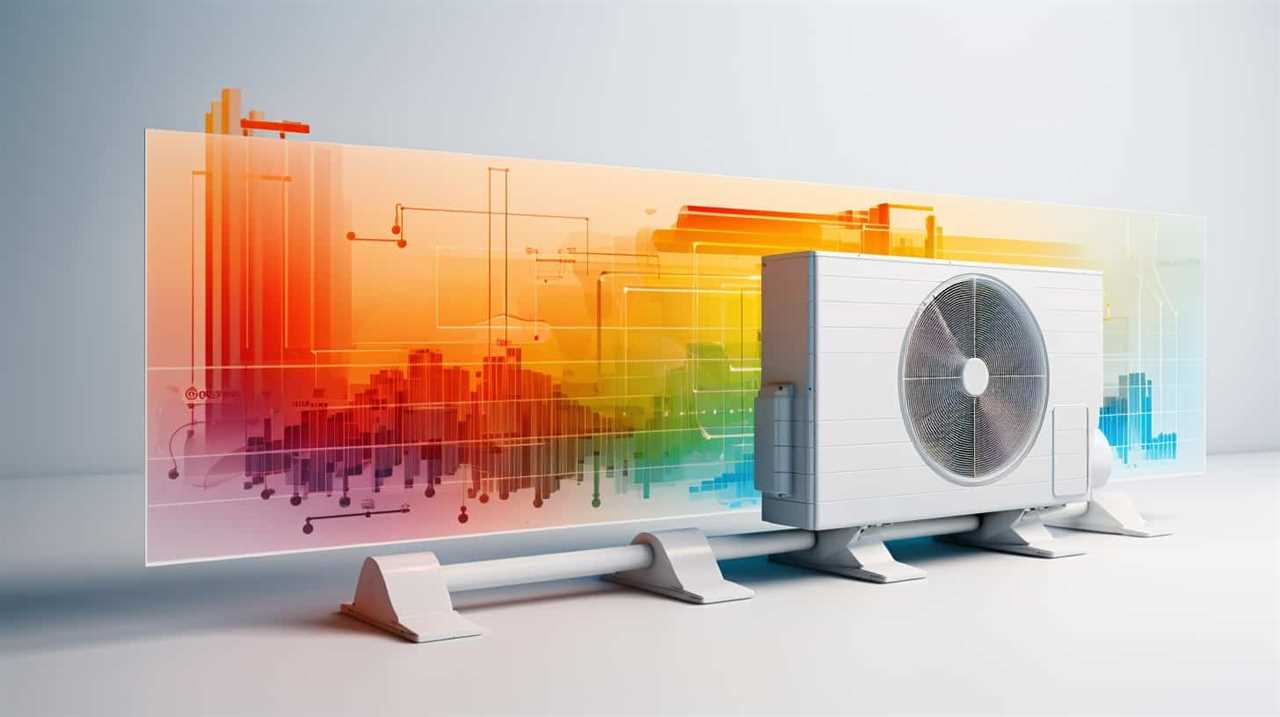
-
Sealing air leaks in ducts and windows prevents unwanted air infiltration, improving indoor air quality and reducing the energy needed to heat or cool the space.
-
Properly sealed ducts ensure that the conditioned air is delivered directly to the desired areas, avoiding wastage.
Advanced Tips and Tricks for Energy Conservation With Heat Pumps
For optimal energy conservation with heat pumps, consider implementing advanced tips and tricks that maximize efficiency and minimize costs. In addition to regular maintenance, there are several key strategies to keep your heat pump running smoothly and effectively. First, make sure to clean or replace air filters regularly to ensure proper airflow and prevent strain on the unit. Second, check and clean the outdoor unit to remove any debris that may obstruct airflow. Third, consider installing a programmable thermostat to regulate temperature settings and reduce energy consumption. Finally, if you encounter any issues with your heat pump, troubleshooting can help identify and resolve the problem. By following these advanced tips and tricks, you can improve the energy efficiency of your heat pump and save on your energy bills.
| Advanced Tips and Tricks | Description |
|---|---|
| Regularly clean or replace air filters | Improves airflow and prevents strain on the unit |
| Check and clean the outdoor unit | Removes debris that may obstruct airflow |
| Install a programmable thermostat | Regulates temperature settings and reduces energy consumption |
| Troubleshoot heat pump issues | Identifies and resolves problems for optimal performance |
Frequently Asked Questions
How Do Heat Pumps Compare to Traditional Heating and Cooling Systems in Terms of Energy Efficiency?
Heat pump technology advancements have made them more energy efficient than traditional heating and cooling systems. Installing a heat pump can lead to significant energy savings, helping us kiss high bills goodbye.
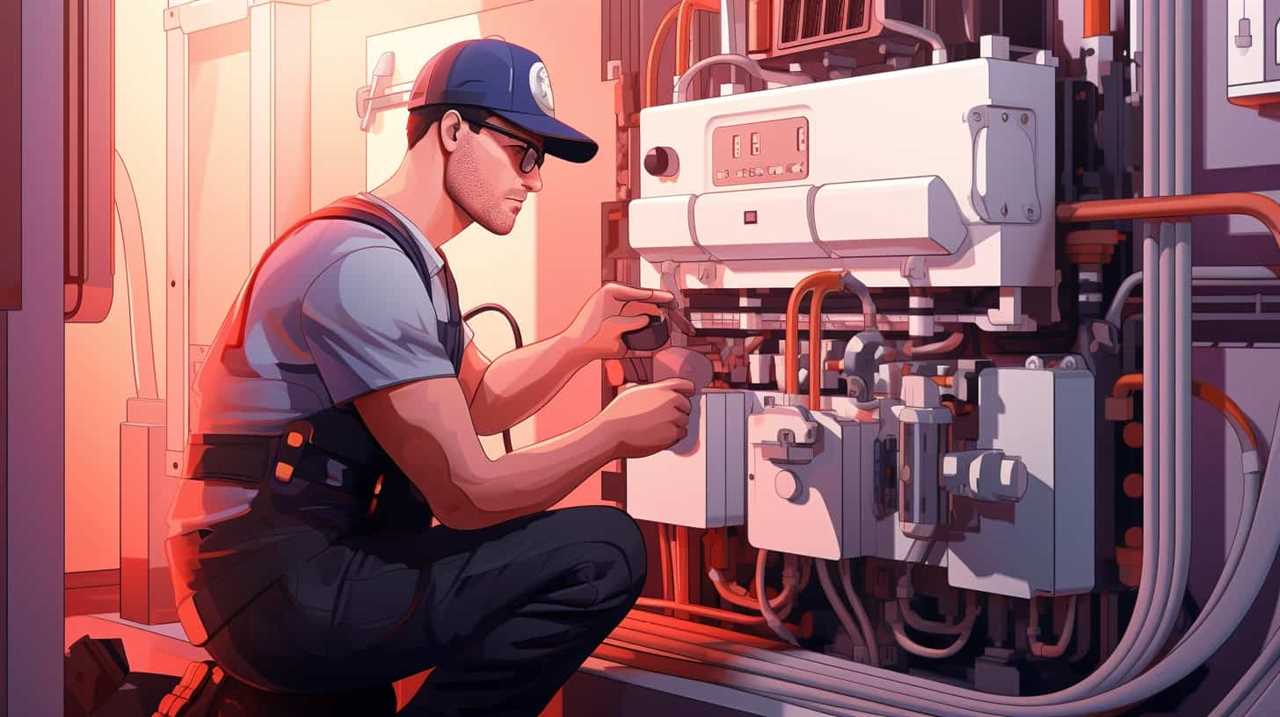
Can Heat Pumps Be Used in All Types of Climates?
Yes, heat pumps can be used in all types of climates. They are highly efficient and adaptable, making them a great choice for both hot and cold environments. Say goodbye to high energy bills!
Are Heat Pumps Suitable for Both Residential and Commercial Buildings?
Yes, heat pumps are suitable for both residential and commercial buildings. They can be used in a variety of climates and offer cost-effective energy conservation solutions for heating and cooling needs.
What Are the Main Factors That Affect the Lifespan of a Heat Pump?
Heat pump maintenance and addressing common heat pump problems are crucial in extending the lifespan of the system. For example, regular filter cleaning and professional inspections can prevent issues and ensure efficient operation for years to come.
Are There Any Government Incentives or Tax Credits Available for Installing Heat Pumps?
Yes, there are government incentives and tax credits available for installing heat pumps. These incentives and credits can help offset the cost of installation and make energy conservation more affordable for homeowners.
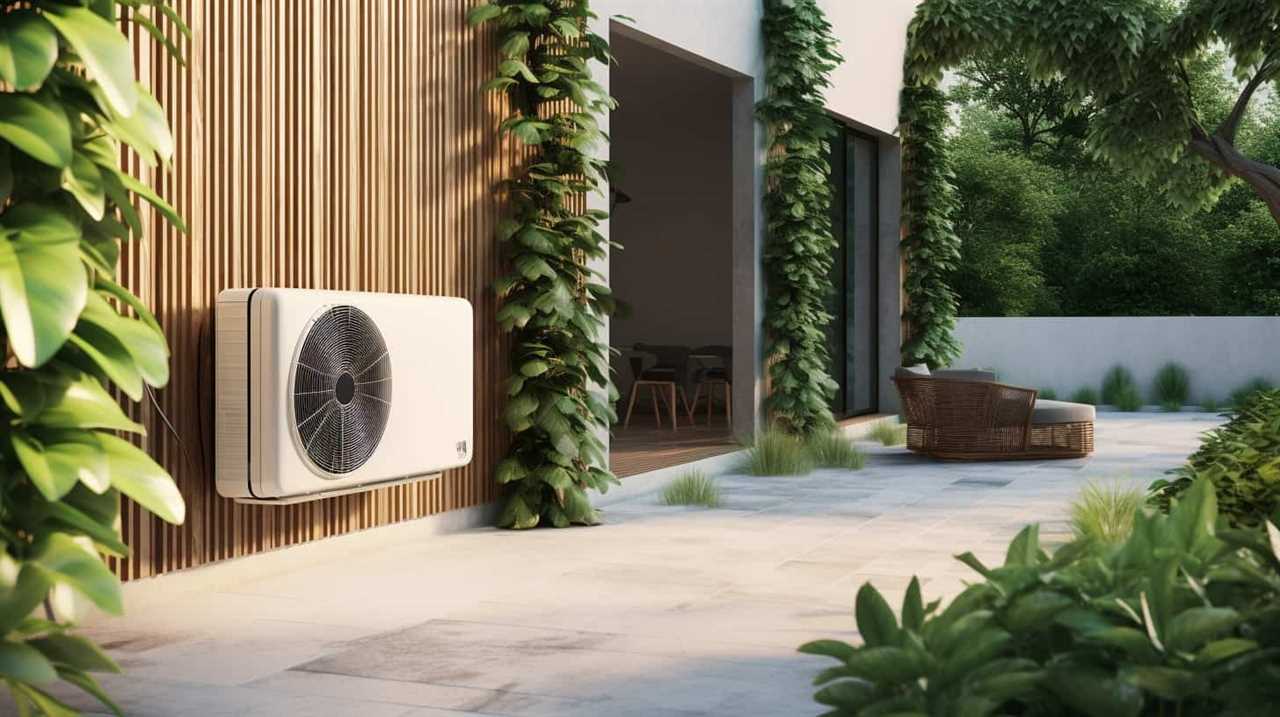
Conclusion
In our journey to kiss high bills goodbye, we’ve discovered the power of heat pumps for energy conservation. These incredible machines work tirelessly to keep our homes warm in winter and cool in summer, all while saving us money.
By optimizing settings, insulating, and sealing our spaces, we unlock the true potential of heat pumps.
So, let’s embrace these energy-saving heroes and let them work their magic, keeping our wallets full and our homes cozy.
Energy Efficiency
Reliable Heat Pumps: Energy Efficiency for a Greener Planet

Imagine a world where we can stay warm without harming our planet. At Reliable Heat Pumps, we believe in making that vision a reality. With our energy-efficient technology, we can enjoy the cozy comfort we crave while reducing our carbon footprint.
In this article, we’ll explore the importance of energy efficiency ratings, understand heat pump efficiency metrics, and compare the environmental impact of different heat pumps.
Join us on our journey towards a greener planet.
Key Takeaways
- Energy efficiency ratings of heat pumps measure their effectiveness in converting energy into heat or cool air, with higher ratings indicating greater energy and cost savings.
- Investing in an energy-efficient heat pump can reduce carbon footprint and lower energy bills over time.
- Regular maintenance, proper insulation, choosing the right size, and strategic placement of heat pumps are factors that influence energy efficiency.
- By comparing energy efficiency ratings such as SEER and HSPF, consumers can make informed decisions to choose heat pumps that provide optimal comfort and reduce energy consumption.
The Importance of Energy Efficiency Ratings
We believe that when it comes to heat pumps, understanding and prioritizing energy efficiency ratings is crucial for a greener planet.

Energy efficiency ratings measure the effectiveness of a heat pump in converting energy into heat or cool air. Higher ratings indicate greater energy savings and cost savings in the long run.
By choosing a heat pump with a high energy efficiency rating, you can reduce your carbon footprint and lower your energy bills. Investing in an energy-efficient heat pump not only benefits the environment but also saves you money over time.
With advancements in technology, heat pumps are becoming increasingly efficient, offering better performance while consuming less energy.
Understanding Heat Pump Efficiency Metrics
Understanding heat pump efficiency metrics is essential for evaluating the performance and energy-saving potential of different models. When it comes to heat pump performance, maximizing energy savings is a top priority for many homeowners. By understanding efficiency metrics, you can make informed decisions that won’t only save you money but also contribute to a greener planet.
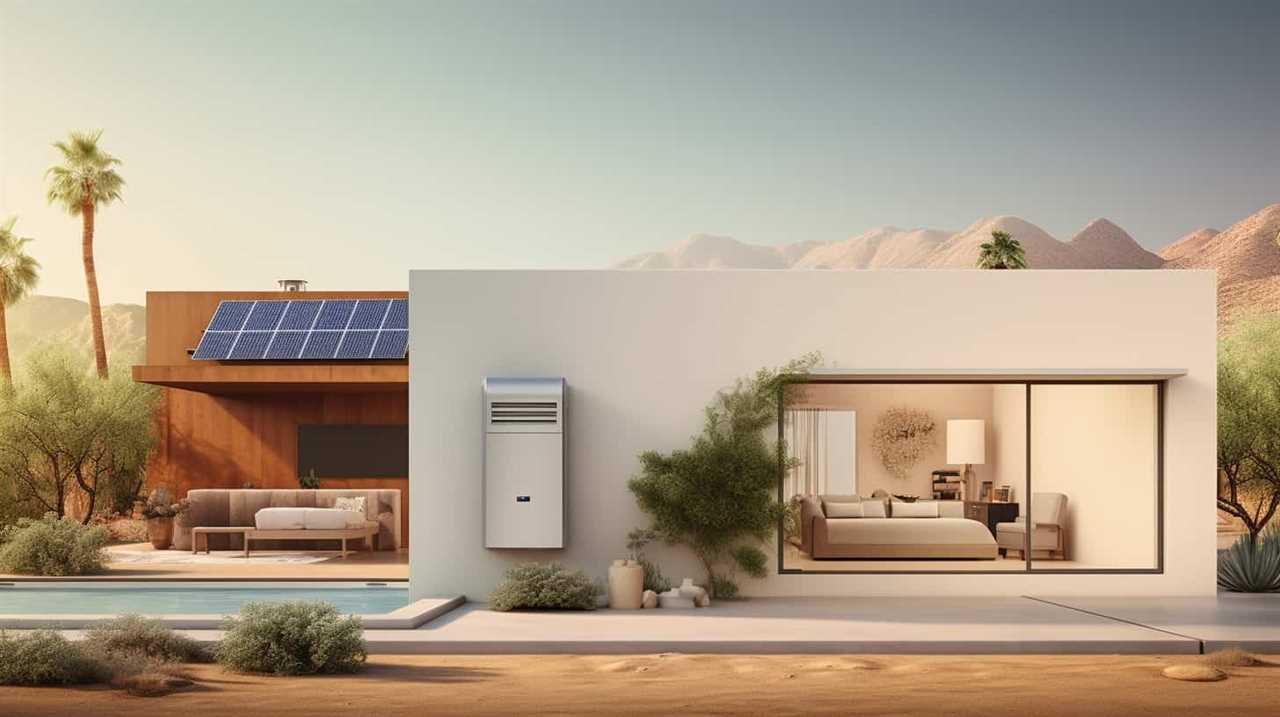
There are several key metrics to consider when evaluating the efficiency of a heat pump. The first is the Seasonal Energy Efficiency Ratio (SEER), which measures the cooling efficiency of the unit. The higher the SEER rating, the more energy efficient the heat pump is. Another important metric is the Heating Seasonal Performance Factor (HSPF), which measures the heating efficiency of the unit. Again, a higher HSPF rating indicates a more efficient heat pump.
Factors Influencing Heat Pump Energy Efficiency
To achieve optimal heat pump energy efficiency, it is important to consider the factors that influence its performance. Heat pump maintenance plays a crucial role in optimizing heat pump performance. Regular maintenance, such as cleaning and replacing filters, lubricating moving parts, and checking refrigerant levels, ensures that the heat pump operates at its peak efficiency. Additionally, proper insulation and sealing of ductwork can prevent energy loss and improve overall efficiency. Another factor to consider is the size of the heat pump. A unit that is too small will struggle to heat or cool a space efficiently, while an oversized unit may cycle on and off frequently, wasting energy. Finally, the location of the heat pump is important. Placing it in a shaded area and away from obstructions can help it operate more efficiently. By considering these factors and investing in regular maintenance, homeowners can maximize heat pump energy efficiency and reduce their environmental impact.
| Factors Influencing Heat Pump Energy Efficiency | |
|---|---|
| Heat Pump Maintenance | Regular cleaning and maintenance ensure optimal performance. |
| Proper Insulation | Insulating ductwork prevents energy loss. |
| Correct Sizing | Choosing the right size heat pump ensures efficient operation. |
| Placement | A shaded area and unobstructed location improve efficiency. |
Comparing Energy Efficiency Ratings of Heat Pumps
Comparing energy efficiency ratings of heat pumps allows us to determine their effectiveness in conserving energy. When evaluating heat pump performance, it’s crucial to consider their energy consumption.
Energy efficiency ratings, such as the Seasonal Energy Efficiency Ratio (SEER) and Heating Seasonal Performance Factor (HSPF), provide valuable insights into the efficiency of heat pumps. The SEER rating measures the cooling efficiency, while the HSPF rating indicates the heating efficiency of the system. Higher ratings indicate better energy efficiency and lower energy consumption.

By comparing these ratings, consumers can make informed decisions and choose heat pumps that won’t only provide optimal comfort but also help reduce energy bills and minimize environmental impact.
Environmental Impact of Energy Efficient Heat Pumps
As we explore the environmental impact of energy efficient heat pumps, it is important to consider their contribution to reducing greenhouse gas emissions. These heat pumps not only provide efficient heating and cooling, but also help to minimize our carbon footprint.
When evaluating the environmental impact of heat pumps, it is crucial to consider their life cycle. This includes the production, use, and disposal of the equipment. Energy efficient heat pumps generally have a lower carbon footprint compared to traditional heating systems, as they operate on electricity rather than burning fossil fuels.
To further illustrate the environmental benefits, let’s take a look at the following table:
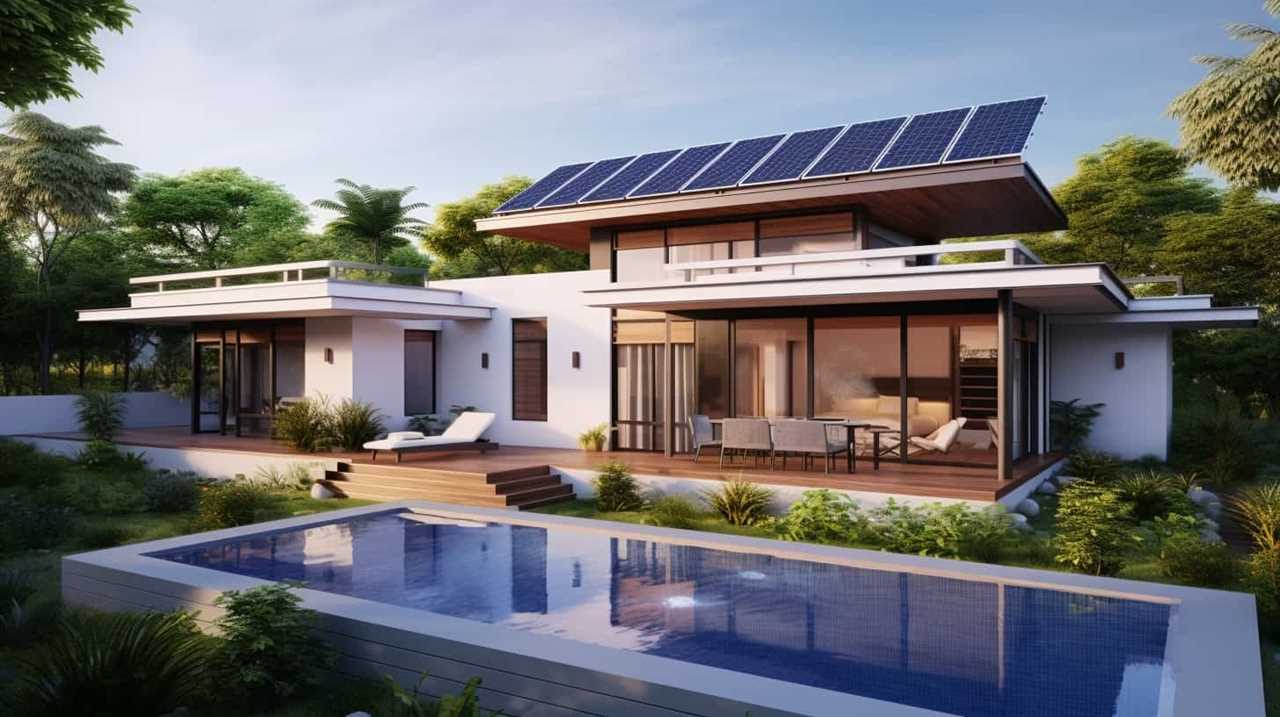
| Environmental Impact | Energy Efficient Heat Pumps | Traditional Heating Systems |
|---|---|---|
| Carbon Footprint | Lower | Higher |
| Greenhouse Gas Emissions | Reduced | Increased |
Frequently Asked Questions
How Does the Size of a Heat Pump Affect Its Energy Efficiency?
When it comes to heat pump size, it directly affects energy efficiency. A properly sized heat pump ensures optimal performance and reduces energy waste. So, choosing the right size is crucial for a greener and more efficient planet.
What Are the Maintenance Requirements for Maintaining the Energy Efficiency of a Heat Pump?
To maintain energy efficient heat pump operation, regular maintenance is required. This includes cleaning or replacing air filters, checking and cleaning coils, and ensuring proper airflow. Don’t neglect the importance of maintenance for a greener planet!
Are There Any Government Incentives or Rebates Available for Purchasing Energy-Efficient Heat Pumps?
Yes, there are government incentives and rebates available for purchasing energy-efficient heat pumps. These incentives can help offset the initial cost of the heat pump and provide long-term energy savings for a greener planet.
Can a Heat Pump Be Used for Both Heating and Cooling Purposes?
Yes, a heat pump can be used for both heating and cooling. It utilizes heat pump technology to transfer heat from one area to another, offering the benefits of energy efficiency. However, there are some drawbacks to consider as well.

How Does the Location or Climate of a Home Affect the Energy Efficiency of a Heat Pump?
Location impact and climate effect the energy efficiency of heat pumps. The specific location and climate of a home determine how well a heat pump can efficiently heat or cool a space, making it crucial to consider these factors when choosing a heat pump.
Conclusion
In conclusion, investing in reliable heat pumps with high energy efficiency ratings is crucial for creating a greener planet. These heat pumps not only save energy and reduce utility bills, but also minimize environmental impact.
By envisioning a world where energy efficient heat pumps are widely adopted, we can picture cleaner air, less pollution, and a healthier planet for future generations.
Let’s take action and choose heat pumps that prioritize energy efficiency for a brighter and more sustainable future.
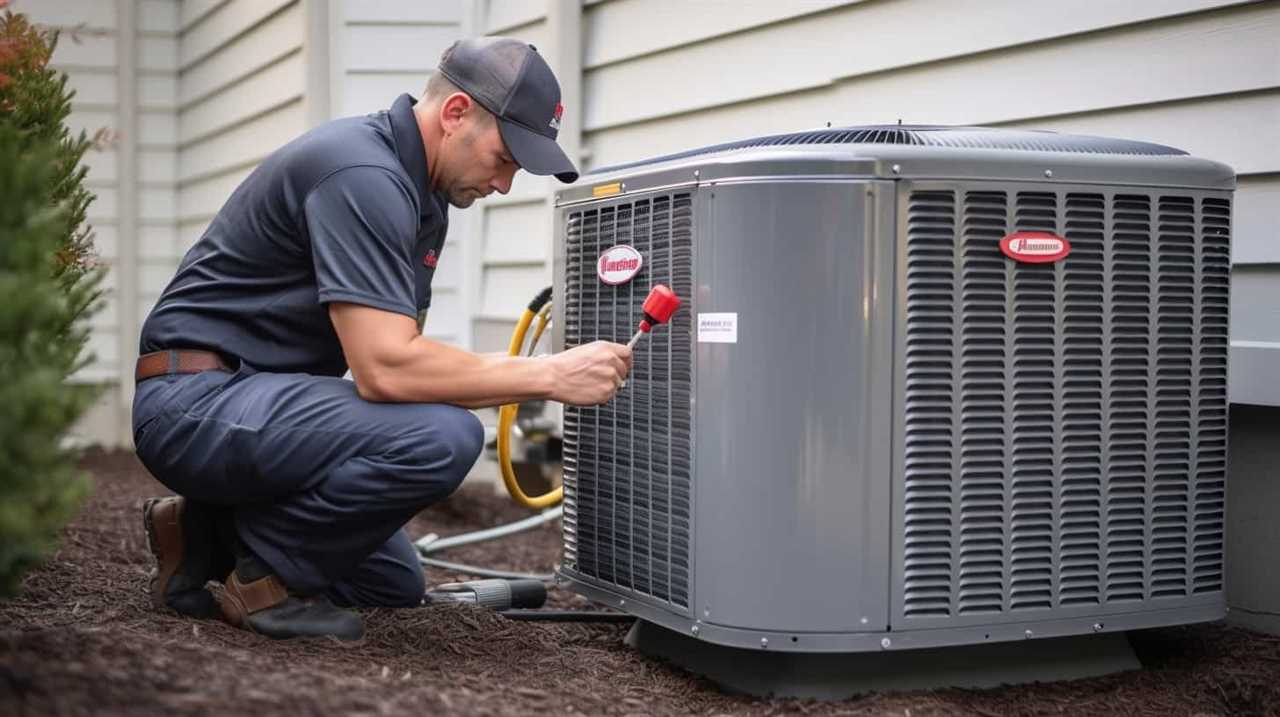
Energy Efficiency
Slash Energy Bills: Mystery of Efficient Heat Pumps

We’ve all been there – dreading the arrival of our energy bills, wondering how we can possibly reduce our consumption without sacrificing comfort.
But what if there was a solution? Enter efficient heat pumps, the mysterious technology that promises to slash those bills and keep us cozy.
In this article, we’ll delve into the secrets behind these energy-saving wonders, exploring their technology, benefits, and cost-saving potential.
Get ready to unlock the mystery and take control of your energy consumption.
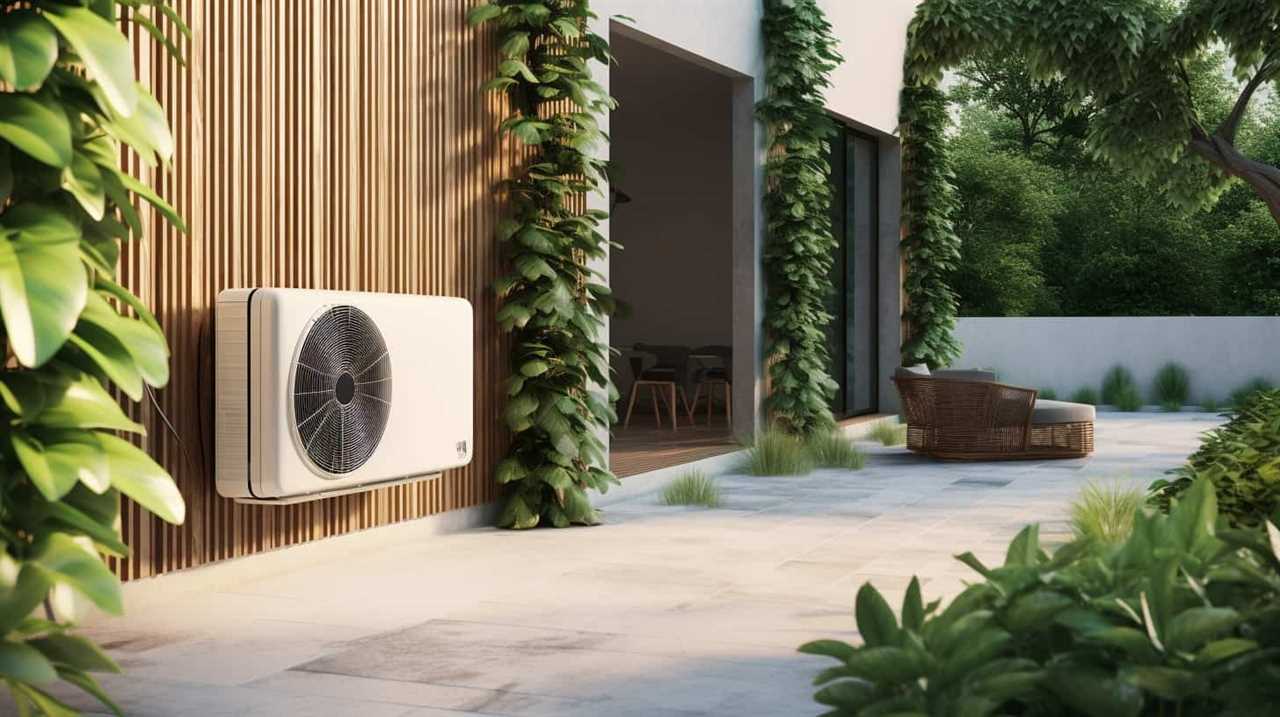
Key Takeaways
- Efficient heat pumps reduce energy consumption by utilizing advanced technology to transfer heat from one area to another.
- They help reduce carbon footprint by relying less on burning fossil fuels and require less energy compared to generating heat from scratch.
- Efficient heat pumps operate at higher efficiency levels, converting more energy into heat, which helps homeowners save money on energy bills and reduce environmental impact.
- Upgrading to an efficient heat pump system can result in reduced carbon footprint and lower greenhouse gas emissions, increased home comfort, and the ability for homeowners to control and customize temperature settings.
How Do Efficient Heat Pumps Reduce Energy Consumption
We can explain how efficient heat pumps reduce energy consumption by utilizing advanced technology and optimizing the transfer of heat from one area to another. By doing so, these heat pumps play a crucial role in reducing carbon footprint and increasing home comfort.
Unlike traditional heating systems that rely on burning fossil fuels, efficient heat pumps work by transferring heat from the air, ground, or water into the home, depending on the type of pump. This process requires significantly less energy compared to generating heat from scratch.
Additionally, efficient heat pumps are designed to operate at higher efficiency levels, meaning they convert more energy into heat. This helps homeowners save money on their energy bills while also reducing their environmental impact.
Understanding the technology behind efficient heat pumps will further demonstrate their potential in revolutionizing home heating systems.
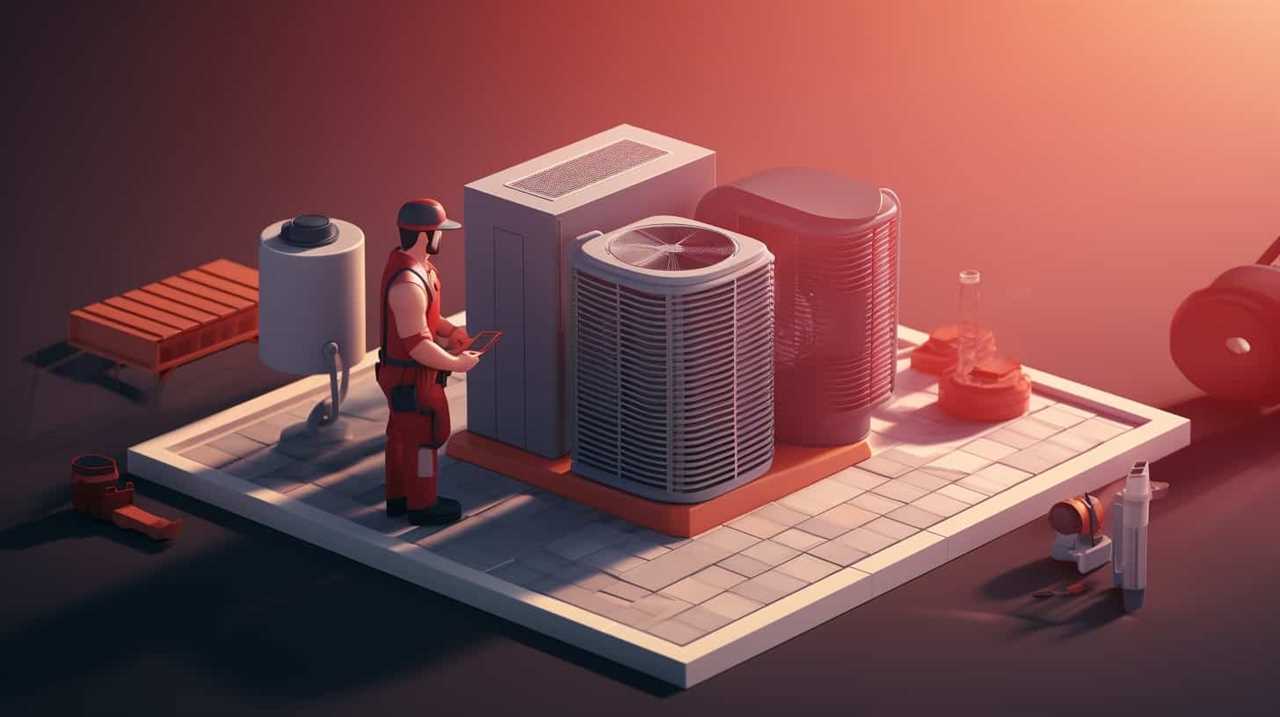
Understanding the Technology Behind Efficient Heat Pumps
By understanding the technology behind efficient heat pumps, we can gain insight into how this innovative system maximizes energy savings and improves home heating. Heat pump operation relies on the principles of thermodynamics and the refrigeration cycle. Here are the key elements to consider:
- Compressor: The heart of the heat pump, it increases the pressure and temperature of the refrigerant.
- Evaporator: Absorbs heat from the outside air or ground, causing the refrigerant to evaporate into a gas.
- Condenser: Releases heat into the home as the refrigerant condenses back into a liquid.
- Expansion valve: Regulates the flow of refrigerant, controlling the system’s efficiency.
Energy-saving features of efficient heat pumps include:
- Variable-speed motors: Adjust the compressor and blower speeds to match the heating or cooling needs, reducing energy waste.
- Smart thermostats: Optimize temperature settings based on occupancy and weather conditions, further enhancing energy efficiency.
Understanding these technological aspects is crucial for homeowners seeking to capitalize on energy savings with efficient heat pumps.
Benefits of Upgrading to an Efficient Heat Pump System
When upgrading to an efficient heat pump system, it’s important to consider the many benefits it can provide. One major advantage is the reduced carbon footprint. Heat pumps use electricity to transfer heat rather than burning fossil fuels, resulting in lower greenhouse gas emissions. By using renewable energy sources to power heat pumps, such as solar or wind, homeowners can further reduce their carbon footprint.
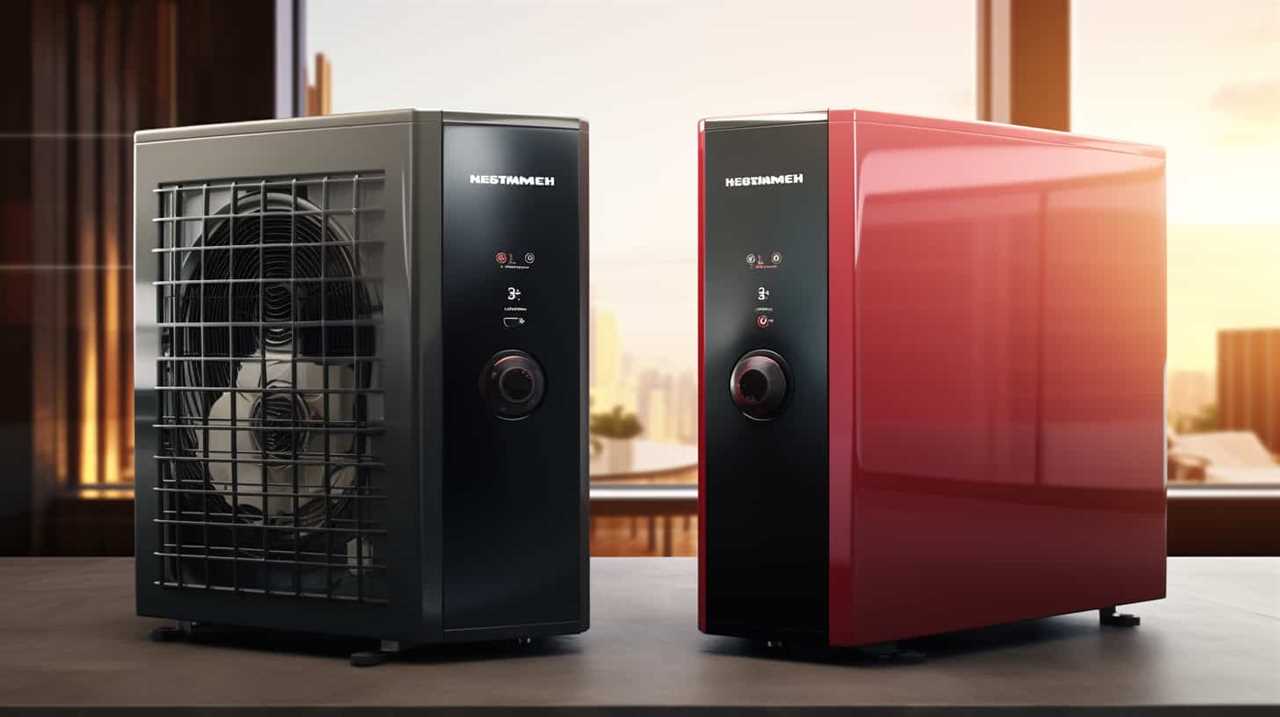
Another benefit of upgrading to an efficient heat pump system is increased home comfort. Heat pumps provide both heating and cooling capabilities, ensuring a comfortable indoor environment all year round. They’re also known for their ability to maintain a consistent temperature, eliminating hot or cold spots in the home. Additionally, heat pumps operate quietly and have advanced features like programmable thermostats, allowing homeowners to control and customize the temperature settings according to their preferences.
Tips for Optimizing the Energy Efficiency of Heat Pumps
To maximize the energy efficiency of our heat pumps, it’s essential to regularly maintain and clean the system. Here are some tips to help you optimize the energy efficiency of your heat pumps:
-
Regularly clean or replace air filters: Dirty filters can restrict airflow and cause the system to work harder, reducing its efficiency. Clean or replace the filters every 1-3 months.
-
Keep outdoor units clear: Ensure that there are no obstructions around the outdoor unit, such as leaves, debris, or tall grass. This allows for proper airflow and prevents the system from overworking.

-
Set the optimal temperature: Keep the thermostat set at an optimal temperature to reduce energy consumption. Lower the temperature in winter and raise it in summer when away from home.
-
Utilize energy-saving techniques: Make use of features such as programmable thermostats to schedule temperature adjustments based on your daily routine. Additionally, consider using zone heating or cooling to direct airflow only to occupied areas.
Exploring the Cost-Saving Potential of Efficient Heat Pumps
Our research reveals the significant cost-saving potential of efficient heat pumps. By utilizing advanced technology and optimizing energy consumption, these heat pumps offer substantial savings on energy bills.
Efficient heat pumps are designed to minimize energy consumption while maximizing heat transfer, resulting in reduced energy costs. These pumps are equipped with features such as variable-speed compressors, which adjust their output based on the heating or cooling demand, further reducing energy usage. Additionally, advanced insulation and improved sealing mechanisms prevent heat loss, ensuring maximum efficiency.

Frequently Asked Questions
Are Efficient Heat Pumps Only Suitable for Certain Types of Homes or Buildings?
Efficient heat pumps can be suitable for various homes or buildings. The efficient heat pump installation process and factors to consider when choosing one depend on the specific requirements and energy needs of the property.
How Long Does It Typically Take to Recoup the Cost of Upgrading to an Efficient Heat Pump System?
It typically takes several years to recoup the cost of upgrading to an efficient heat pump system. However, the energy savings over time can help offset the initial investment and provide long-term financial benefits.
Can Efficient Heat Pumps Be Used in Both Hot and Cold Climates?
In both hot and cold climates, efficient heat pumps can be a game-changer. They outperform traditional heating systems in terms of efficiency, saving us money while keeping us comfortable. Climate does impact their efficiency, but they still offer significant energy savings.
Are There Any Government Incentives or Rebates Available for Installing Efficient Heat Pumps?
Government incentives and energy efficiency programs are available for installing efficient heat pumps. These programs aim to reduce energy consumption and promote the use of renewable energy sources, offering financial benefits to homeowners and businesses.

What Maintenance Is Required to Keep an Efficient Heat Pump System Running Optimally?
Regular heat pump maintenance is crucial for optimal performance. Servicing includes cleaning filters, checking refrigerant levels, inspecting electrical connections, and lubricating moving parts. This ensures energy efficiency and extends the lifespan of the system.
Conclusion
So there you have it, folks. Efficient heat pumps are like the superheroes of energy consumption, slashing those pesky bills with their incredible technology.
Upgrading to one of these bad boys won’t only save you money, but also make your home more energy efficient. And hey, who doesn’t want to optimize their energy efficiency?
So go ahead, explore the cost-saving potential of efficient heat pumps and watch your bills shrink faster than a melting ice cube.
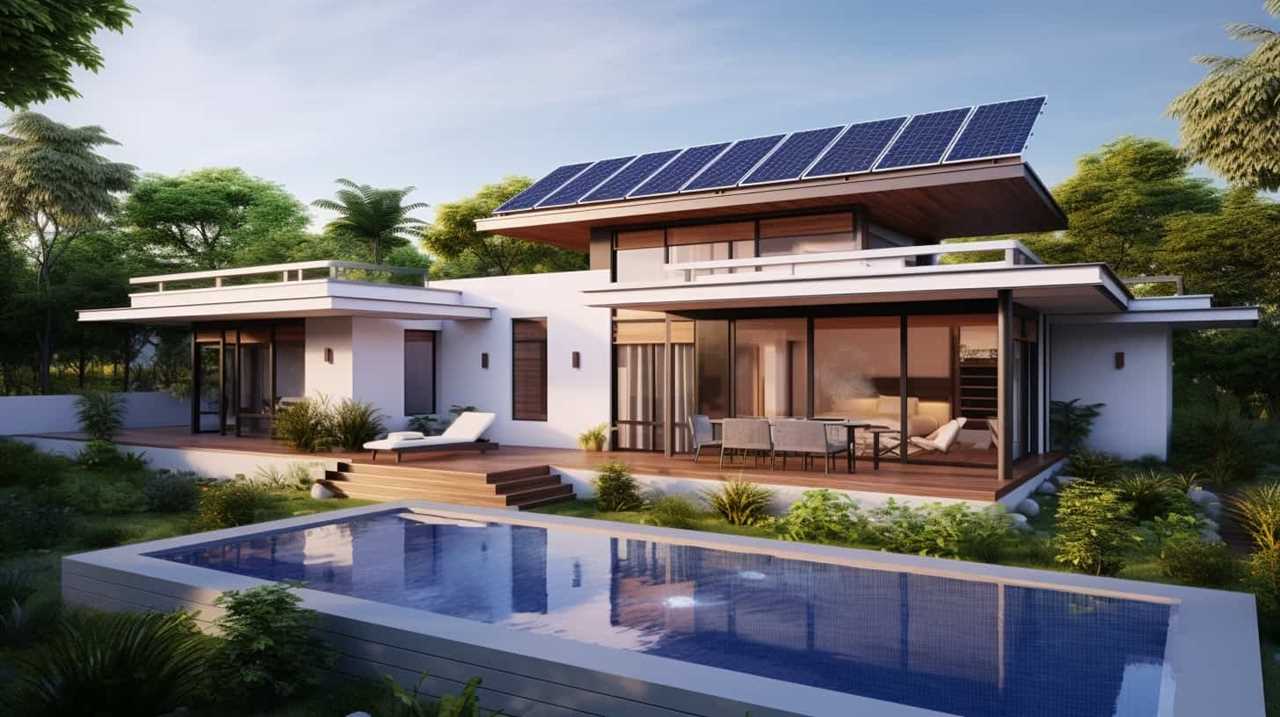
It’s a win-win situation, my friends.
-

 Residential and Commercial Applications1 week ago
Residential and Commercial Applications1 week agoBest Amana Heat Pump Reviews
-

 Thermal Energy Transfer2 weeks ago
Thermal Energy Transfer2 weeks agoBreakthroughs in Modern Heat Pump Systems: Thermal Energy Edition
-

 Residential and Commercial Applications1 week ago
Residential and Commercial Applications1 week agoBest Heat Pump
-

 Geothermal Heat Pumps3 months ago
Geothermal Heat Pumps3 months agoUpgrade Your Comfort with Our Efficient HVAC Systems
-

 Air Conditioning2 months ago
Air Conditioning2 months agoExploring Energy-Efficient Air Conditioning Heat Pumps
-

 Geothermal Heat Pumps3 months ago
Geothermal Heat Pumps3 months agoInnovative Geothermal Heat Pump Manufacturers Revolutionize Energy Efficiency
-

 Thermal Energy Transfer1 month ago
Thermal Energy Transfer1 month agoBoost Your Heat Pump Efficiency: Interactive Guide
-

 Residential and Commercial Applications1 week ago
Residential and Commercial Applications1 week agoBest Portable Heat Pump Heat & AC










